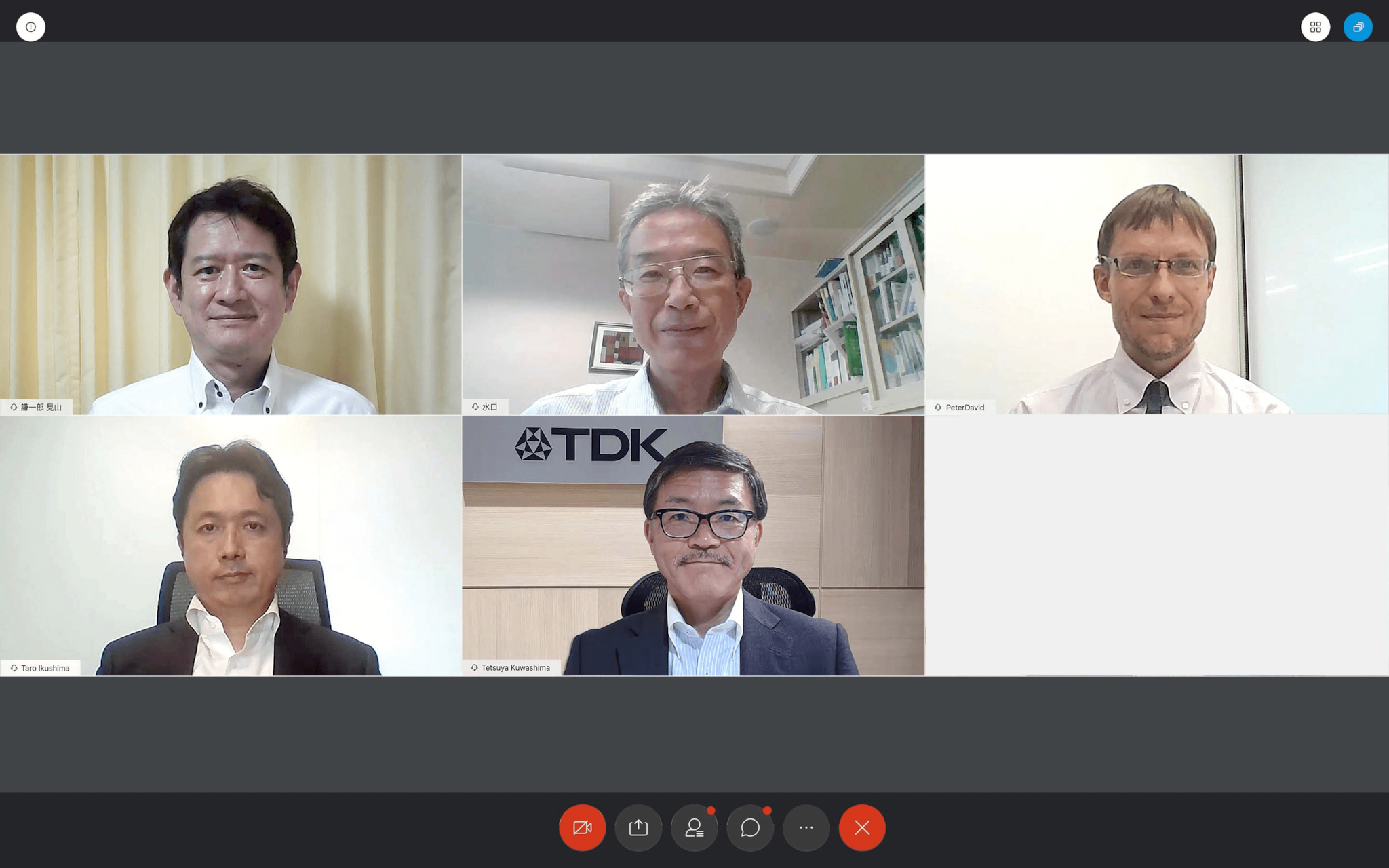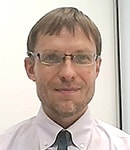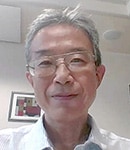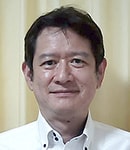Dialogue: Crafting Materiality with Social Value at the Core
Value Creation sets out an approach that calls for balancing the creation of a sustainable society with corporate growth by using Social Value as a starting point for improving Commercial Value and Asset Value. To achieve Value Creation, the TDK Group has identified key issues to reaching the goals of its Medium-Term Plan, and has worked to identify materiality in a way that encompasses its existing key CSR issues. As part of that process, in August 2020 TDK held a dialogue with three experts in order to verify the adequacy of and any shortcomings in this materiality from a stakeholder’s perspective, and reflect them therein. We received a wide range of opinions based on the draft materiality under consideration by TDK. (The positions and affiliations of the participants are as of August, 2020.)
Key opinions and recommendations from the experts
■ Hoping to see you spur your employees to action by setting out firm goals based on your corporate philosophy
Peter David Pedersen
Professor, Graduate School of Leadership and Innovation Shizenkan
Representative director, NELIS (Next Leaders’ Initiative for Sustainability)
Materiality is an indication of where your company can contribute through its business to changing the world in a sustainable manner. In general, materiality tends to become a cut-and-dried exercise, but that will not motivate people or organizations to act. Under firm goals built on your corporate philosophy, address society’s major issues and enhance your ability to transform yourselves. Demonstrate your pioneering spirit and set out together on a journey to innovation. I look forward to seeing you establish strong taglines (words that easily convey your corporate concepts, philosophy and identity) that communicate the excitement of being a company at the forefront of creating a new age, and tying those taglines to Value Creation and materiality. A resilient organization is one that can overcome whatever it encounters—a company that is anchored (has firm goals based on its philosophy and reputation), adaptive, and aligned with the expectations of society and its
stakeholders, the “three A’s.”
While I can empathize with your description of EX and DX as addressing materiality through business, the draft, at least, seems to still have a strong CSR focus. I would like to see you present TDK’s business strategy itself, clarifying the kind of society TDK hopes to achieve beyond EX and DX while pursuing not contributions, but innovation that leads to a competitive advantage. With regards to EX, I also hope you will set out more ambitious targets based on the fact that the world is already moving beyond “low-carbon” to “decarbonization,” and that both decarbonization and circularity are being emphasized.
You have included many items in “Materiality as the foundation for value creation,” and I feel these need to be somewhat better organized.
You touch on EX and DX here as well, but the impression is that it will be difficult to convey outside the company the difference between this and the EX and DX you describe in “Addressing materiality through business.”
Meanwhile, addressing supply chain management and human rights are of high importance on a global level as well. As vulnerable populations are being hit hard by the Covid-19 pandemic, your stance regarding what you do to ensure society’s resilience is being called into question.
■ Work to unify your Medium-Term Plan and materiality, sending a clearer message about the future TDK envisions
Takeshi Mizuguchi
Professor, Faculty of Economics, Takasaki City University of Economics
As priorities in materiality are called into question, I get the impression that your draft for materiality as the foundation for value creation is too all-encompassing, and includes too many items. For example, while boosting R&D is essential in terms of long-term corporate growth, in the short term it will increase costs, which is incompatible with improving asset efficiency. It is important to clarify how you will allocate limited management resources, including where to focus and what to prioritize in the event of a conflict.
Under addressing materiality through business, you mention contributing to EX and DX. While both of these are important, I get the sense that this makes it difficult to see what makes TDK unique, and lacks individuality. Compared to Value Creation 2020, your Medium-Term Plan for FY March 2018-2020, which was both specific and convincing in clearly specifying your goals, your draft materiality this time seems to be somewhat generalized. While there is a tendency to fall into the abstract when trying to describe an uncertain future, you still need to indicate in your materiality which areas TDK will focus on going forward, and what core technologies you intend to hold on to. I also get the impression that under the current draft, Value Creation and materiality are being considered independent of one another. I believe the two should be treated as a single whole, and I would like to see you communicate your vision for TDK while emphasizing the connection between the two.
It is also important to consider TDK’s position and its reason for being from a broader perspective, keeping the global spread of supply chains in mind. With today’s emphasis on stakeholder capitalism, which takes into consideration fairness to a variety of stakeholders, I recommend that TDK deepen its discussion of basic principles, including how you will address the relationship between government policies and human rights issues in the countries from which you procure materials.
■ Provide an in-depth description of why you seek to address social issues, and tell stories born from this intrinsic motivation
Kenichiro Miyama
Specially Appointed Professor, School of Business Administration, Senshu University
TDK has a wonderful history: a university-originated venture company that has grown into a global enterprise through a philosophy of “contributing to culture and industry through creativity.” Under the current draft, I get the impression that the focus is on explaining the “what” and the “how”, but the “why” behind TDK’s efforts to address social issues is less clear. External motivation—such as trends in SDGs and ESG—alone will not allow those efforts to take root within the company. You need to turn your history into future stories, providing the entire Group—including companies you have acquired—with an in-depth description of your intrinsic motivation: the fact that TDK is primarily a company whose core business is contributing to society. In addition, materiality is not a one-and-done proposition; it is important that people who share the same ideals and values come together to discuss and continually improve it.
Another important point, I think, is that Value Creation is an upgraded version of the Kotozukuri (integrated solutions) you have worked on to date. As uncertainty about the future increases, we may not be able to see “things” in terms of what kinds of products will be needed going forward, but we can imagine them in terms of what kind of future we wish to create. In general, manufacturing companies tend to fall into product-centric thinking, but TDK is a company that creates solutions to achieve dreams, making the impossible possible through its business. I hope to see you contribute to society through creation based on imagination.
For risk management and opportunity management, part of materiality as the foundation for value creation, I recommend you switch the order of risk and opportunity. Japanese companies tend to be overly cautious about risk, but the role of a company is to aggressively seize opportunity. I would thus like to see a clearer description of the relationship between taking advantage of opportunities and properly addressing the risks that arise from them.
Response to the opinions
Our thanks to all who offered this range of opinions.As we are involved in a wide range of businesses, we have incorporated a variety of elements in our draft materiality, based in part on the hope that this will lead to action that involves all of our divisions and out of consideration for society’s needs. However, as you point out, the result has been a diminishment of what makes TDK unique. In response, we would like to carefully discuss how to achieve this balance strategically.
We think there are three key words that best express TDK’s characteristics: noise, heat, and sensors. How to best eliminate noise on electronic circuits, and how to control heat that is lost in energy conversion? These mission-critical questions highlight areas in which TDK can best demonstrate its strengths. In addition, we are uniquely positioned to contribute to a more efficient society by sensing and processing data on all kinds of events. With these points in mind, we would like to deepen the discussion and shed light on the source of TDK’s creativity and potential for innovation.
Your opinions also gave us a renewed understanding of the importance of decarbonization and circularity. As a midstream company, we must first clear any technical issues in order to collaborate with customers to create a cooperative system while considering the full scope of possibility across the entire supply chain.
With the elements comprising materiality already in place, we believe the question going forward will be how to tell the story. We will carefully review TDK’s strengths and sources of creativity and incorporate them in taglines that all of our employees can get behind. We will devote ourselves wholly to the current draft so that we can communicate TDK’s philosophy and vision widely both in and outside the Group.
Taro Ikushima
General Manager,
Corporate Planning Group,
Corporate Strategy HQ
Tetsuya Kuwashima
General Manager,
Safety & Environment Group,
Sustainability Promotion HQ
Sachiko Nagahara
General Manager,
Sustainability Promotion HQ





